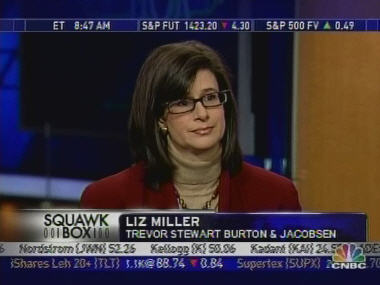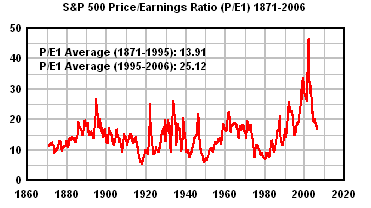
Dynamics

|
Generational Dynamics |
| Forecasting America's Destiny ... and the World's | |
| HOME WEB LOG COUNTRY WIKI COMMENT FORUM DOWNLOADS ABOUT | |
Confused economists, whose predictions have been up and down like a yoyo, have gone back to the drawing board again, after Friday's government employment report from the Bureau of Labor Statistics (BLS) showed a surge of 167,000 jobs in December.
Economists at first had projected a growth of 150,000 jobs, but changed their minds after the ADP National Employment Report predicted a loss of 40,000 jobs. At that point, the consensus forecast went to the 100,000-110,000 range. The increase of 167,000 jobs is higher than any of the mainstream economists predicted.
Since 2004, the unemployment rate has been steadily going down, and employment data (total number of jobs) has been steadily increasing:
 |
However, the job mix has been shifting, as manufacturing jobs have fled to China and other countries. In December, the economy lost 12,000 manufacturing jobs, but gained 178,000 service-producting jobs. Service-producing jobs include things like consulting, accounting, legal services, and financial services.
The December employment number is always the most volatile, mainly because of the seasonality of holiday employment. Weather may also have played a factor: Temperatures have been unseasonably high from the midwest to New England.
Listening to economists debate these figures this morning on CNBC, it's obvious that they were all pretty flummoxed by the unexpectedly high jobs data.
 |
However, one person's analysis really caught my interest. She referred to price/earnings (P/E) ratios, and her expectation of "P/E expansion," or P/E increases.
Liz Miller, of Trevor Stewart Burton & Jacobsen, said the following:
She added that she expects the market to increase by 11-14% this year, thanks to "stabilizing P/E's."
Now Ms. Miller is a cute young chick, but being a woman obviously hasn't made her any smarter than all the airhead male analysts of her generation, all of whom apparently believe that the world was created ten years ago. Why else would she say, "We've had the lowest P/E in ten years"?
 |
I've discussed P/E ratios on this web site many times. As you can see from the adjoining graph, the P/E ratio has indeed been very high for the last 10 years -- that's because of the stock market bubble that began in 1995.
But if you look at the graph prior to the bubble, you see that the average P/E index is about 14, and that the values are normally in a range between 10 and 20, but it's averaged 25.12 since the bubble started. Furthermore, the index has gone well below 10 six times in the last century. And this isn't exactly ancient history -- it was around 7 in the early 1980s.
This is exactly one of the reasons why a stock market panic is overdue. With stocks overpriced by a factor of 240%+, we can expect a panic that will drive stock prices down to the Dow 3000-4000 range.
But I guess this IS ancient history to Ms. Miller, because Ms. Miller doesn't care about anything that happened prior to 1995. That's why I say that she apparently believes that the world was created 10 years ago, and she believes that we'll be in a bubble forever.
What's apparent from the graph is this: The P/E ratio index has been far above average since 1995, and has been generally falling since 2001, and will presumably keep falling. At any rate, there's certainly no reason to predict, as Ms. Miller does, that we're going to have "P/E expansion," and that it will go up above 20 again. The index has been going down, and almost certainly it will keep going down.
It's much worse than that. The long-term average is 13.91, but it's averaged 25.12 since 1995. In order to compensate for the huge P/E values since 1995, the index will have go far below its average value for a comparably long time, or over ten years. This is the principle of "mean reversion," and it's as certain a law as the Law of Gravity or the Law of Supply and Demand.
You know, this isn't exactly rocket science; it's much closer to simple arithmetic. And high-paid analysts like Liz Miller should know this stuff, because it's their job to know it. Instead, these analysts say incredibly stupid things as a matter of course.
Generational Dynamics has been predicting since 2002 that we're entering a new 1930s style Great Depression, with a stock market crash most likely by the 2006-2007 time frame.
What's happened since 2001 is that the world's central banks have pumped huge amounts of money into the world economy. This prevented a stock market crash in 2002, but it created huge bubbles in stocks, real estate and commodities. If the central banks hadn't done that, we'd have had a crash, but the worst of it would have been over by now. Now we're going to have a FAR WORSE crash that will last FAR LONGER.
The real estate bubble has been deflating since October, 2005, and
commodity prices (for oil, copper and others) have been falling
sharply in the last few weeks. A stock market crash could begin next
week, next month, next year or thereafter, but the deflation of these
bubbles, combined with the idiocy of the current generations of stock
analysts, indicates that the time is probably approaching quickly.
(5-Jan-07)
Permanent Link
Receive daily World View columns by e-mail
Donate to Generational Dynamics via PayPal
Web Log Summary - 2016
Web Log Summary - 2015
Web Log Summary - 2014
Web Log Summary - 2013
Web Log Summary - 2012
Web Log Summary - 2011
Web Log Summary - 2010
Web Log Summary - 2009
Web Log Summary - 2008
Web Log Summary - 2007
Web Log Summary - 2006
Web Log Summary - 2005
Web Log Summary - 2004
Web Log - December, 2016
Web Log - November, 2016
Web Log - October, 2016
Web Log - September, 2016
Web Log - August, 2016
Web Log - July, 2016
Web Log - June, 2016
Web Log - May, 2016
Web Log - April, 2016
Web Log - March, 2016
Web Log - February, 2016
Web Log - January, 2016
Web Log - December, 2015
Web Log - November, 2015
Web Log - October, 2015
Web Log - September, 2015
Web Log - August, 2015
Web Log - July, 2015
Web Log - June, 2015
Web Log - May, 2015
Web Log - April, 2015
Web Log - March, 2015
Web Log - February, 2015
Web Log - January, 2015
Web Log - December, 2014
Web Log - November, 2014
Web Log - October, 2014
Web Log - September, 2014
Web Log - August, 2014
Web Log - July, 2014
Web Log - June, 2014
Web Log - May, 2014
Web Log - April, 2014
Web Log - March, 2014
Web Log - February, 2014
Web Log - January, 2014
Web Log - December, 2013
Web Log - November, 2013
Web Log - October, 2013
Web Log - September, 2013
Web Log - August, 2013
Web Log - July, 2013
Web Log - June, 2013
Web Log - May, 2013
Web Log - April, 2013
Web Log - March, 2013
Web Log - February, 2013
Web Log - January, 2013
Web Log - December, 2012
Web Log - November, 2012
Web Log - October, 2012
Web Log - September, 2012
Web Log - August, 2012
Web Log - July, 2012
Web Log - June, 2012
Web Log - May, 2012
Web Log - April, 2012
Web Log - March, 2012
Web Log - February, 2012
Web Log - January, 2012
Web Log - December, 2011
Web Log - November, 2011
Web Log - October, 2011
Web Log - September, 2011
Web Log - August, 2011
Web Log - July, 2011
Web Log - June, 2011
Web Log - May, 2011
Web Log - April, 2011
Web Log - March, 2011
Web Log - February, 2011
Web Log - January, 2011
Web Log - December, 2010
Web Log - November, 2010
Web Log - October, 2010
Web Log - September, 2010
Web Log - August, 2010
Web Log - July, 2010
Web Log - June, 2010
Web Log - May, 2010
Web Log - April, 2010
Web Log - March, 2010
Web Log - February, 2010
Web Log - January, 2010
Web Log - December, 2009
Web Log - November, 2009
Web Log - October, 2009
Web Log - September, 2009
Web Log - August, 2009
Web Log - July, 2009
Web Log - June, 2009
Web Log - May, 2009
Web Log - April, 2009
Web Log - March, 2009
Web Log - February, 2009
Web Log - January, 2009
Web Log - December, 2008
Web Log - November, 2008
Web Log - October, 2008
Web Log - September, 2008
Web Log - August, 2008
Web Log - July, 2008
Web Log - June, 2008
Web Log - May, 2008
Web Log - April, 2008
Web Log - March, 2008
Web Log - February, 2008
Web Log - January, 2008
Web Log - December, 2007
Web Log - November, 2007
Web Log - October, 2007
Web Log - September, 2007
Web Log - August, 2007
Web Log - July, 2007
Web Log - June, 2007
Web Log - May, 2007
Web Log - April, 2007
Web Log - March, 2007
Web Log - February, 2007
Web Log - January, 2007
Web Log - December, 2006
Web Log - November, 2006
Web Log - October, 2006
Web Log - September, 2006
Web Log - August, 2006
Web Log - July, 2006
Web Log - June, 2006
Web Log - May, 2006
Web Log - April, 2006
Web Log - March, 2006
Web Log - February, 2006
Web Log - January, 2006
Web Log - December, 2005
Web Log - November, 2005
Web Log - October, 2005
Web Log - September, 2005
Web Log - August, 2005
Web Log - July, 2005
Web Log - June, 2005
Web Log - May, 2005
Web Log - April, 2005
Web Log - March, 2005
Web Log - February, 2005
Web Log - January, 2005
Web Log - December, 2004
Web Log - November, 2004
Web Log - October, 2004
Web Log - September, 2004
Web Log - August, 2004
Web Log - July, 2004
Web Log - June, 2004